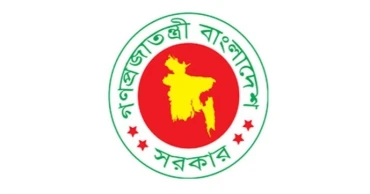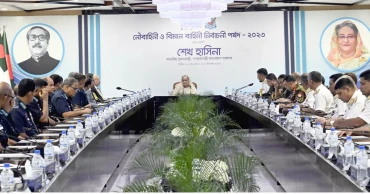prime minister
Libyan PM greets PM Hasina on her re-election
Libyan Prime Minister Abdul Hamid Moahmed Al-Dabaiba has congratulated Sheikh Hasina on her reelection as prime minister of Bangladesh for a fifth term.
“We were delighted to learn of your well-deserved confidence and appointment as the Prime Minister for a fifth term in the friendly Republic of Bangladesh,” he wrote in a letter.
Women should be proud of PM Hasina for her capability, leadership: India's President
The Libyan PM has recently sent the letter to Sheikh Hasina, said the Prime Minister’s Press Wing here on Friday.
On this occasion, Abdul Hamid said he is pleased to extend his sincerest congratulations to Hasina, wishing her success, prosperity, and progress for her esteemed people under her leadership of the government of Bangladesh.
Ajit Doval's Dhaka visit part of high level exchange between 2 countries: MEA
“I would like to take this opportunity to express our immense pride in the strong bonds of brotherhood that exist between our two friendly nations,” he continued.
“We are steadfast in our commitment to strengthen these ties and enhance future cooperation in various fields to serve our common interests,” the Libyan premier concluded.
Bangladesh not becoming a one-party state: Hasan Mahmud tells foreign correspondents in Delhi
2 years ago
PM’s 6 advisors get portfolios
The Cabinet Division on Sunday announced the portfolios of six advisors appointed by Prime Minister Sheikh Hasina.
Dhaka calls for solidarity, unity, strong South-South cooperation to achieve sustainable development
Dr Mashiur Rahman will act as economic affairs advisor while Dr Towfique-e-Elahi Chowdhury will deal with power, energy and mineral resources, Dr Gawhar Rizvi international affairs, Salman F Rahman private industry and investment, Dr Kamal Abdul Naser Chowdhury education and cultural affairs and Maj Gen (retd) Tarique Ahmed Siddique security affairs, according to the Cabinet Division.
2 years ago
Foreign friends continue to send congratulations to PM Hasina on her election win
Bangladesh’s friends and partners from across the world keep congratulating Prime Minister Sheikh Hasina on her election victory as she is set to form her new cabinet on Thursday with a likely mix of new and old faces.
They vowed to work together with the government and people of Bangladesh to strengthen their ties with the country.
Even though the United States concluded that Sunday’s election was not “free or fair” it voiced commitment to work with Bangladesh.
"Looking ahead, the United States remains committed to partnering with Bangladesh to advance our shared vision for a free and open Indo-Pacific, to supporting human rights and civil society in Bangladesh, and to deepening our people-to-people and economic ties," said US State Department Spokesperson Mathew Miller a day after the voting.
The European Union (EU) said it will continue to work with the government of Bangladesh on the priorities that characterise their longstanding relations in the political, human rights, trade and development spheres including the country’s possible future access to the GSP+ preferential trade scheme.
Democracies have weaknesses, but they attain maturity only through practice: Foreign Ministry tells diplomats
"The EU strongly encourages all stakeholders to respect political pluralism, democratic values and international human rights standards and to engage in peaceful dialogue," said High Representative Josep Borrell Fontelles in a statement on behalf of the EU.
It is essential that the media, civil society and political parties can carry out their work without censorship or fear of reprisals, said the EU.
The United Kingdom encouraged all political parties to address their differences and find a common way forward in the interests of the people of Bangladesh. "We will continue to support this process.”
The UK, however, said the January 7 election did not provide the “fullest options” to the Bangladeshis.
The Australian government has urged the Bangladesh government to "prioritise" the strengthening of its democratic institutions, which "underpin" the protection of human rights, the rule of law, and the promotion of development.
"As a close partner, Australia remains committed to working with Bangladesh to achieve our shared vision for an open, stable, prosperous and inclusive region," said the Australian government in a statement on Bangladesh elections.
Earlier, India, Japan, China, Russia, South Korea, Malaysia, Indonesia, the Muslim world and other South Asian countries congratulated Prime Minister Sheikh Hasina.
Nepal's Prime Minister Pushpa Kamal Dahal Prachanda extended a cordial invitation to Hasina to pay a visit to Nepal at a convenient time.
Commonwealth Secretary-General Patricia Scotland KC also congratulated Prime Minister Sheikh Hasina on her election victory.
"My congratulations to you- Prime Minister Sheikh Hasina, on your electoral victory," she said.
The Commonwealth Secretariat stands ready to partner with Bangladesh to achieve national priorities and looks forward to working with the PM for the people of Bangladesh and all members of the Commonwealth Family, she said.
Canada, however, expressed its “disappointment” that this electoral process has “fallen short of” the principles of democracy and freedom upon which Bangladesh was founded, and called on the relevant authorities to work transparently with all parties to move forward towards democracy, respect of human rights and fundamental freedoms in line with the interests of the people of Bangladesh.
“Canada commends and supports the democratic aspirations of Bangladeshi citizens and condemns the acts of intimidation and violence that took place ahead and during the elections,” said the Canadian government in a statement on January 9.
Nepal's PM congratulates Sheikh Hasina on re-election, extends invitation
On the other hand, Canada-Bangladesh Parliamentary Friendship Group congratulated Prime Minister Sheikh Hasina on her election victory.
“We look forward to further deepening the ties between Canada and Bangladesh and will continue working with you and your government to that end,” a message to PM Hasina reads.
Chair of Canada-Bangladesh Parliamentary Friendship Group, Brad Redekopp, MP; Vice Chair Salma Ataullahjan; Kevin Waugh, MP; Larry Brock, MP; and Ken Hardie, MP jointly sent the congratulatory message.
Congratulating Prime Minister Sheikh, founder and Executive Chairman of the World Economic Forum, Professor Klaus Schwab, said he is confident that under her leadership, Bangladesh will be able to fully realize its economic potential and become a developed country by 2041.
“The bold reforms taken forward under your leadership have helped raise Bangladesh’s economic and social standing,” Schwab said in a message to PM Hasina.
“The World Economic Forum looks forward to working closely with you and your government to support in achieving its full growth potential,” he said.
Bangladesh Institute of Development Studies (BIDS) Director General Binayak Sen has said the United States is undeniably a strong influencer of development dynamics but it needs to rethink its role.
He said the US needs to fund for new economic projects, duty free access, new FDI opportunities, and stopping global conflicts.
In a separate message shared on X (formerly Twitter), he said almost everyone agrees that the parliament lacks strong opposition. “AL needs to find a way out.”
Bangabandhu's Homecoming Day observed at Bangladesh Embassy in Tokyo
The country’s challenges are huge, which need to be settled through open and sharp debates, the economist said. “I propose that Article 70 of the constitution be abrogated to allow dissents and differences,” he mentioned.
By now, the government has said, Bangladesh’s democratic polity has reached a stage where smooth and peaceful transition of power between elected governments is ensured without any undemocratic arrangement.
"Democracies have weaknesses, but they attain maturity only through practicing democracy," said the Ministry of Foreign Affairs in a briefing note shared with the diplomats stationed in Dhaka on Tuesday.
Although many leaders and activists of BNP were keen to participate, it is regrettable that its top leadership decided otherwise on the pretext of their unconstitutional demand for the provision of a caretaker government, MoFA conveyed to the diplomats.
In 2011, Supreme Court of Bangladesh declared the unelected caretaker provision ultra vires and void as it conflicts with the spirit of democracy as a fundamental principle of our State Policy.
The 12th Parliamentary elections of Bangladesh were held on January 7 in a "free, fair, impartial and transparent" manner with spontaneous participation of the voters, MoFA said.
The 2024 polls have set a new milestone in the history of the journey of parliamentary democracy in Bangladesh, it said.
“We look forward to seeing better partnership, better cooperation and better accommodation. This is essential to us,” said Foreign Minister AK Abdul Momen.
He said Bangladesh has made many achievements due to cooperation and collaboration.
2 years ago
Hasina wins Gopalganj-3
Awami League President and Prime Minister Sheikh Hasina has been elected unofficially in Gopalganj-3 constituency in the 12th general election.
She bagged the seat achieving 2,49,965 votes in her constituency while her nearest rival M Nizam Uddin Lascar from Bangladesh Supreme Party secured 469 votes, said Returning officer of the district Kazi Mahbubul Alam.
National Election: Palak wins 4th term
The polling that began at 8:00 am concluded at 4pm without any break amid tight security in 299 out of the country’s 300 constituencies. The counting of votes started immediately after the end of voting.
No pressure on voters to vote, but leaflets from ‘a party’ asking not to go, says FS quoting CEC
Awami League President and Prime Minister Sheikh Hasina cast her vote at Dhaka City College in the capital this morning.
Election Commission Secretary Jahangir Alam on Sunday said 27.15 % votes were cast till 3 pm on Sunday.
Independent candidate for Sylhet-3 says election rally attacked by AL candidate's campaigners
2 years ago
Barishal cheers PM Hasina as she arrives to address campaign rally
The southern riverine district of Barishal has been in a festive mood marking the visit of the Prime Minister Sheikh Hasina, her first to the area in five years.
Hasina, the president of ruling Awami League, is visting Barishal as part of her campaign tour ahead of January 7 general election.
Also read: Make January election festive, competitive: PM Hasina at campaign rallies
Thousands of AL leaders, including party's candidates and actvists, shouted slogans in favour of its election symbol, boat, as the party chief arrived here in the morning.
Hasina will address an election rally at the historic Bangabandhu Udyan in the divisional headquarters.
Decorated with banners, posters and flags the city welcomed the PM.
2 years ago
Posts, Telecom minister Mustafa Jabbar resigns
Posts, Telecommunications Minister Mustafa Jabbar, serving in the technocrat (non-MP) quota, submitted his resignation letter on Sunday.
Jubo League member injured in cocktail blast at city’s Paltan area
“I submitted my resignation letter to the Cabinet Division as per the directive of the Prime Minister,” said Mustafa Jabbar while talking to reporters at his office on Monday.
Dhaka Metro Rail Passes: How to Buy and Recharge
However, there will be no obstruction in performing duties until the government accepts the resignation, he said.
Earlier, the Prime Minister asked the technocrat ministers to resign from their respective posts ahead of the 12th Parliamentary election, slated to be held on January 7, he added.
Three vehicles set ablaze in Dhaka, Rajshahi, Gazipur
2 years ago
Ecnec nods 44 projects worth Tk 39,094 crore
The Executive Committee of National Economic Council (Ecnec) on Thursday approved a large number of 44 projects involving an estimated cost of some Tk 39,094 crore.
The approval came from the Ecnec meeting presided over by Prime Minister and Ecnec Chairperson Sheikh Hasina at the NEC conference room in the city’s Sher-e Bangla Nagar area.
“A total of 45 projects were placed in the meeting. But 44 schemes have been approved and the rest one has been sent back,” Planning Minister MA Mannan told reporters.
Ecnec approves 19 projects to cost Tk 18,067 crore
Among the overall cost of Tk 39,094.33 crore, some Tk 29,953.44 crore will come from the national exchequer, while Tk 7,579.73 crore from the foreign sources and Tk 1,561.16 crore from the own funds of the concerned organisations.
In terms of the cost, the largest three new projects are ‘Land Acquisition and Utility Transfer for Upgrading Bhanga-Jessore-Benapole Highway into Four-Lane’ project involving an estimated cost of Tk 6,140.19 crore; ‘Extended Dhaka Water Supply Resilience’ Project with Tk 4040 crore; and ‘Jashore Export Processing Zone area’ project with Tk 1,642.73 crore.
Ecnec clears projects to establish Chattogram Medical University, procure 340 CNG buses for BRTC
The other largest projects include ‘Construction of Town and Union Land Offices across the country (Phase-II)’ project with Tk 1,595.62 crore; ‘Integrated infrastructural development of Sylhet City Corporation including extended areas’ project with Tk 1,459.74 crore; ‘Upgrading the connecting roads of Lakshmipur, Noakhali and Feni districts with Bangabandhu Sheikh Mujib Shilpa Nagar into due standard and width’ project with Tk 1,404.46 crore; ‘Construction of gas, power and communications infrastructures for Moheshkhali Economic Zone-3 (Dholghata)’ with Tk 1,195.32 crore; and ‘Improvement of Urban Public Health Preventive Services’ Project with Tk 1,181.50 crore.
During the meeting, the PM asked the authorities concerned to gradually come out from the trend of providing subsidies on different sectors particularly electricity and water in a bid to reduce burden on the state coffer.
Ecnec nods setting up 50 technical training centres
"We'll have to come out from the practice of subsidies in phases. Utilities like electricity and water are universal and are used by all. All from a minister to a cleaner equally enjoy the benefits of such subsidies," Mannan quoted the PM as saying.
The premier suggested fixing area-wise and income-wise charges for electricity and water services.
2 years ago
BIWTA to hold boat race marking PM Hasina's birthday
Bangladesh Inland Water Transport Authority (BIWTA) has organised a boat race on the Turag river, on the occasion of Prime Minister Sheikh Hasina's birthday.
Dhaka’s air quality ‘unhealthy’, 5th worst in the world this morning
The boat race will be held tomorrow (September 28), at the end point of the main road in Mohammadpur's Dhaka Udyan, on the Turag river, at 3:30 pm, said Senior Information Officer of Shipping Ministry, Jahangir Alam Khan.
US visa restrictions won’t impact garment exports: BGMEA
State Minister for Shipping, Khalid Mahmud Chowdhury, will be present as the chief guest, while Haji Mohammad Salim will be present as a special guest along with others. BIWTA Chairman Commodore Arif Ahmed Mostafa will preside over the event.
Govt refixes commission rates on sales of petroleum fuels
Twelve teams named after rivers -- Buriganga, Shitalakhya, Turag, Dhaleshwari, Ichhamoti, Karnaphuli, Surma, Kirtankhola, Arial Kha, Dakatia, Bongshi and Balu -- will participate in different segments of the boat race.
2 years ago
Bangladesh maintains friendly relations equally with all: PM Hasina
Prime Minister Sheikh Hasina on Sunday said Bangladesh has been maintaining a friendly relationship equally with all for the sake of uplifting the socio-economic condition of the people.
“We’ve a very good relationship with every country. Since we’re following the policy the Father of the Nation had given us, we’re maintaining a friendly relation equally with all. Because, our goal is to uplift the socio-economic condition of our country’s people,” she said.
The premier was addressing the Bangladesh Navy and Bangladesh Air Force Selection Board-2023 at the Secretariat of Navy Chief here in the city.
Hasina said her government has successfully been improving the socio-economic condition of the country’s people.
She also extended her sincere thanks to the armed forces and all others concerned for their cooperation with the government’s goal to improve the life of the people.
Read: Threat to remove govt or any sanctions will bring no gain: PM
“We’ll not engage in a war with anyone. We’ll maintain a friendly relation with all,” she said, adding that her government has successfully been able to maintain such a relation as well.
The PM said Bangladesh has been moving forward following the ‘Friendship to All Malice towards None’ policy, which was incorporated by Father of the Nation Bangabandhu Sheikh Mujibur Rahman in the Foreign Policy.
“We don’t want war with anyone. We want to live in peace. But we’ll have to have all sorts of preparations to safeguard our independence and sovereignty,” she said, stressing the need for modernizing the country’s armed forces.
Promote patriotic, competent officers in Navy and Air Force: PM to selection board
The premier praised the tabulated record and comparative evaluation method followed in case of promotion of Navy and Air Force officers, describing it as a modern and logic-based system.
She asked the selection board to carry out a prudent and neutral assessment to pick the officers who have high morality, morale, knowledge on practical aspects, patriotism, spirit of liberation war, sense of responsibility and instant decision-making power and prudence for the promotion in the two forces.
Read: Stay awake like sentinels for progress of Bangladesh: PM Hasina urges BCL
"You should choose the officers, who are good in taking decisions at any time and capable of gaining success by applying their prudence in any situation, for the leadership positions,” she said.
She said the country’s armed forces stand beside the people in every disaster and tough time. “You have been able to earn the trust and confidence of the people, which is the biggest matter,” she said.
The PM said her government has successfully taken the country forward and raised its dignity on the international stage after assuming power in 2009.
“We’ve earned self-dependency economically. Not only that, a brightened image of Bangladesh has also been created before the entire world. Bangladesh has been able to emerge as a role model for development,” she said.
Sheikh Hasina focused on her government’s various successes and steps taken for modernizing the armed forces.
2 years ago
Navy Chief M Nazmul Hassan promoted to Admiral
Chief of Naval Staff, M Nazmul Hassan, has been promoted to the rank of Admiral.
The navy chief was conferred the new rank in the presence of Prime Minister Sheikh Hasina at the latter’s official residence Ganabhaban on Sunday, said a press release.
Read: New navy chief pays courtesy call on PM
He was adorned with the new rank badge by Acting Chief of Army Staff Lt Gen Ataul Hakim Sarwar Hasan and Chief of Air Staff Air Chief Marshal Shaikh Abdul Hannan.
PM’s Security Affairs Adviser, Major Gen (rtd) Tarique Ahmed Siddique; PM’s Principal Secretary, M Tofazzel Hossain Miah; Principal Staff Officer of the Armed Forces Division, Lt Gen Waker-Uz-Zaman; and Senior Secretary of Defence Ministry, Golam Md Hashibul Alam, were present in the function.
Read: New navy chief calls on President Shahabuddin
2 years ago



















